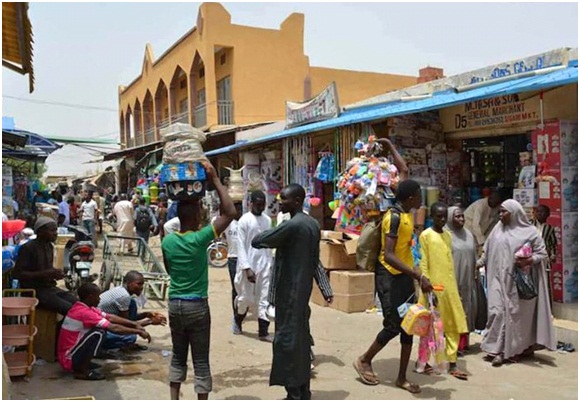Looting, looting everywhere!

By Babatunde Ayedoju
|
Since the Federal Government of Nigeria removed fuel subsidy last year, Nigerians have faced economic hardship which is obviously unbearable. Though the Federal Government and State Governments have put in place measures to cushion the effects of the fuel subsidy removal on the masses, Nigerians are still groaning in pain over the high cost of living, accompanied by soaring exchange rate of the naira to dollar.
Consequently, there have been reported cases of protests in several states across the country. Unfortunately, the protests are now taking another dimension with looting of both public and private warehouses. For example, a group of supposedly aggrieved Nigerians on Sunday stormed a warehouse believed to be owned by the National Emergency Management Authority (NEMA) in the morning and made away with several items there.
However, NEMA in a statement on its X account, denied ownership of the looted warehouse in Abuja. The statement read, “The attention of the National Emergency Management Agency has been drawn to media reports on Sunday alleging that the Agency’s warehouse was looted by some hoodlums in Abuja.
“This is to clarify that the looted warehouse does not belong to NEMA. However, the Agency sympathizes with owners of the looted facility.
“To forestall any security breach at NEMA facilities, the Director General Mustapha Habib Ahmed has directed Zonal Directors and Heads of Operations to strengthen security in and around the Agency’s offices and warehouses nationwide.”
Whether the warehouse belongs to NEMA or not, it is on record that the same warehouse was looted during COVID-19 pandemic in 2020.
Meanwhile, men of the Nigerian Army foiled an attempt to raid a factory warehouse at the Idu Industrial District, Jabi, Abuja, the Sunday morning, arresting five of the attackers. The factory was involved in the production, processing, and packaging of various agro-commodities including grains, rice, pulses, and edible oil.
The incident occurred about 9.30am shortly after some hoodlums attacked a warehouse belonging to the Agricultural and Rural Development Secretariat of the FCT Administration located in the Dei-Dei area of the capital city.
The FCT Police Public Relations Officer, Josephine Adeh, while confirming the looting of the Dei-Dei warehouse, said that the situation had been brought under control.
Cases of warehouse looting are obviously not new in Nigeria. Last week, some youths who were reportedly protesting over rising food prices and economic hardship in the country stole food items from trucks stuck in traffic along Kaduna Road in Suleja, Niger State. The attackers reportedly overwhelmed the truck drivers and looted scores of bags of rice before they were dispersed by security operatives.
Likewise, last year, some individuals invaded a NEMA warehouse in Adamawa State, looting relief materials meant for the masses as subsidy palliative. Items stolen there included bags of rice, gallons of vegetable oil, palm oil, spaghetti and pumping machines. the hoodlums also stole maize, rice, beans, corn, generator, wrappers, mattresses and plastic buckets from some private shops, even as neighbouring Taraba State was not spared, as protesters also stole food items from some warehouses.
The Adamawa State incident was so bad that the Governor, Ahmadu Fintiri, had to impose a curfew on the state, while the Police reportedly arrested over a hundred suspects in connection with the incident.
Still fresh in the memory is the looting of a warehouse in the premises of the Chief Magistrate Court, Akure, in October 2020. A viral video of the incident which surfaced on social media at that time showed people packing out bags and cartons of the palliatives which were expected to be shared by the government to cushion the effect of the COVID-19 pandemic on the masses. The palliatives include bags of rice, sugar, indomie noddles, and other food items. Similar cases were recorded at that time in Lagos, Edo, Plateau, Kwara and Osun States.
While no one can justify looting of public property by individuals under any guise, it is worthy of note that before now, there had been looting of Nigerian treasury by elite saddled with the responsibility of providing exemplary leadership for Nigerians. Meanwhile, a lot of never get to account for their actions, as in most cases they are not prosecuted.
According to Dataphyte, a research and data news platform, as at 2022, 31 former governors had been arrested and detained by the Economic and Financial Crimes Commission (EFCC) but only seven had so far been convicted.
Former Chairman of EFCC, Abdulrasheed Bawa, had boasted in 2021 that the Commission secured the conviction of 978 corrupt Nigerians between January and September that year, a purposes indication that the antigraft agency was winning the war against corruption. However, only two high profile public office holders were on the list, namely, Abdulrasheed Maina, former Head of Pension Taskforce; and Farouq Lawan, a former National Assembly member from Kano State.
Eminent Nigerians who have been arrested by EFCC but were never convicted included former Governor of Zamfara State, Abdulaziz Yari, who was grilled over an attempt to illegally move ₦300 billion from a corporate account to a new generation bank but was never taken to court; Theodore Orji of Abia State who was arrested in 2021 alongside his son but released on administrative bail. He was alleged to have mismanaged ₦2 billion ecological fund and SURE-P fund.
Senator Godswill Akpabio in 2015 was arrested by the EFCC based on a petition by Abuja-based lawyer, Leo Ekpenyong, for allegedly looting the state treasury while he was Governor of Akwa-Ibom State. Even former Governor of Kano State and former presidential aspirant, Rabiu Musa Kwankwaso, was once arrested based on a petition by retired employees of the state for mismanaging pension remittance to the tune of ₦10 billion from 2011 to 2015. Others include former Governor Tanko Al-makura of Nassarawa State, and Bukola Saraki and Abdulfatah Ahmed both of Kwara State.
Meanwhile, in April 2022, the Council of State, led by the then President Muhammadu Buhari, granted a pardon to former Governors Jolly Nyame and Joshua Dariye of Taraba and Plateau States respectively. Until then, Nyame was serving a jail term of 12 years for diverting ₦1.64 billion during his tenure as Taraba State Governor, while Dariye was serving a jail term of 10 years for mismanaging ₦1.126 billion while in office.
Professor Simon Ehiabhi from the Department of History and International Studies, Adekunle Ajasin University, Akungba-Akoko explained that there is looting as corruption done by public office holders and looting out of hunger which is as a result of the poor state of the economy, adding that it will be wrong for any government to attempt any form of persecution against such people, because if economy was good, they won’t dabble into that.
He said, rather, government should address corruption and cushion the effects of the harsh economy on people, for example, by introducing price control. He also recommended that government should reexamine its policies and find ways to restore hope in the hearts of the populace.
Dr Salman Adisa, a psychologist, attributed the recent looting of warehouses to the fact that people are seriously hungry, adding that some do not have food to eat at all
He said, “No money, no job. It’s complicated by the fact that people loot Government resources and seem to go scot free because we don’t hear the conclusion of the case. We have seen examples in recent times.”
While stating that looting in whatever form should not be encouraged, Adisa said that people who engage in it need to know the implication of what they are doing to their lives, saying, “for example, they can be jailed and that will further damage their lives.”
He also admonished them to be patient and channel their grievances to the appropriate quarters.
In the words of Dr Mrs. Kemi Adebola, what is wrong is wrong, whether it is looting among the elite or among the masses. She said, “For those who loot government resources, we don’t see them while they are doing it. They have a way of covering what they are doing. Meanwhile, anytime they are caught, even after leaving office, they are still brought to justice. Therefore, that cannot justify the kind of looting of warehouses that we see going on these days.”
She also admonished that Nigerians should be patient and see what the government would come up with.












